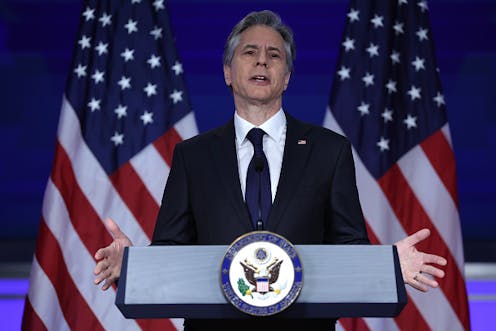
US Secretary of State Antony Blinken’s visit to three African countries this week is another sign of the Joe Biden administration’s US-Africa policy of reengaging with the continent.
This was first unveiled in visits to Nigeria, Kenya and Senegal at the end of 2021.
This time he is visiting South Africa, Rwanda and the Democratic Republic of the Congo (DRC).
These are welcome visits following the previous administration’s disengagement with Africa and less than flattering comments about African countries.
Blinken’s first trip to Africa in 2021 outlined the US’s need to build a 21st century partnership with the continent. This is key to maintaining the US’s strategic geo-political and economic influence in Africa against the backdrop of increased competition between advanced and emerging countries in an increasingly complex world.
The Biden administration’s re-engagement policy is also informed by other considerations, such as China’s rising influence.
Some media reports have suggested that Blinken’s trip is aimed at countering China and Russia’s footprint in Africa. In particular, Russian Foreign Minister Sergei Lavrov’s recent visit.
But it is difficult to claim that Blinken’s visit is singularly informed by the Russia - Ukraine conflict. After all, Blinken’s first visit took place before the Russian invasion of Ukraine.
Blinken is launching the US strategy for sub-Saharan Africa. This is anchored on engaging Africa in promoting an open and stable international system in security, exchange and trade.
This will also tackle the effects of climate change, food security, global pandemics and shape technological and economic futures.
In a speech given at the University of Pretoria in South Africa, Blinken reiterated – as he did in Nigeria in November 2021 – that he wanted to treat African countries as equal partners.
Pressing issues
In Pretoria, Blinken focused on four priorities that he believed the US and Africa could tackle together.
The first was “to foster openness”. This would require the free flow of ideas and information, respect for international law, territorial integrity and national sovereignty. And US support for Africa’s quest to choose its own path and not just be instruments of the progress of other nations.
Blinken said:
The United States will not dictate Africa’s choices, neither should anyone else. The right to make those choices belongs to Africans.
The idea of an equal partnership could be pursued through areas of common interest: global health, the climate crisis, inclusive economic growth, democracy and peace and security.
Blinken said that the US strategy was founded on sub-Saharan Africa’s capacity as a geopolitical force. For him the equal partnership is informed by Africa’s diversity, agency and focuses on
what we will do with African nations and peoples, not for African nations and peoples.
The second priority was partnering with Africa to fulfil the promise of democracy. He referenced Afro-barometer surveys that show Africans are largely against authoritarianism.
And he acknowledged that delivering on democracy dividends – and the threat to democracy – were not just an African problem, but a global challenge. This included the US where the insurrection at the Capitol revealed fissures in US democracy.
However, the US would work with Africa to promote more inclusive and resilient processes and communities, citizen participation and the peaceful transition of power. These would be subjects of an African leaders summit in December 2022.
The third priority is working with Africa to recover from the economic devastation wrought by the Covid-19 pandemic. And laying the foundation for economic opportunities for people. The US position is rooted in the understanding that helping Africa recover is also in the US and the world’s interest.
Blinken spelt out the ways in which the US will “be there for African countries”. These included rallying rich countries and key institutions to support debt relief, supporting the African Union’s Green Recovery Action Plan, climate finance, humanitarian and food relief, investment in agriculture, vaccine self-sufficiency and sharing vaccine technology.
The US is also supporting African-led initiatives such as the African Continental Free Trade Area and the African Union Agenda 2063. The US also pledged to raise over US$200 billion dollars to invest in infrastructure.
Other areas includes intellectual exchanges such as the Young African Leaders Initiative.
The fourth priority area is leading with Africa on clean energy transition, reducing emissions and restoring ecosystems. It would help save the planet, adapt to the effects of climate change and provide power for economic growth.
He reiterated the US will invest in expanded energy access and meet developmental targets towards a just energy transition; helping communities to choose “conservation over deforestation”.
Blinken rounded off by reiterating that these priorities were first championed by Africa and Africans, and have now become the world’s priorities as well.
Engaging Africa as equal partners
Whatever equal partnership means in this case, even if it is spelt mostly in terms of American rather than a (South) African Strategies for partnership, it looks as though the key take-away was a carefully considered business agreement couched as friendship.
In the past, the US’s partnerships with Africa have been informed and characterised by power relations in which the US dictated the terms.
It remains to be seen the extent to which the four areas of cooperation (not too dissimilar to the five points presented in West Africa 2021) will reflect the notion of equal partnership with African countries on the ground.
In our view the significant rise in Beijing’s influence on the continent is a factor in the US redefinition and resetting its relations with Africa.
But Washington still has a long way to go. It must overcome growing anti-west sentiment on the continent given the development alternative that China offers.
For instance, while China (and Russia for that matter) does not make upholding democracy and human rights a condition for engaging with African states, the US bases its partnership on advancing these values. This and other factors such as neo-colonialism fuel anti-West sentiment against the US.
It’s re-engagement approach should therefore consider African perspectives on how the issues of diversity, democracy and human rights can be pursued.
Overall, Blinken’s stated commitment to “equal” partnership with Africa, if truly implemented, has the potential to deconstruct these perceptions and the sentiments they produce. The starting point would be to focus on and invest in young people on the continent.
The authors do not work for, consult, own shares in or receive funding from any company or organization that would benefit from this article, and have disclosed no relevant affiliations beyond their academic appointment.
This article was originally published on The Conversation. Read the original article.







